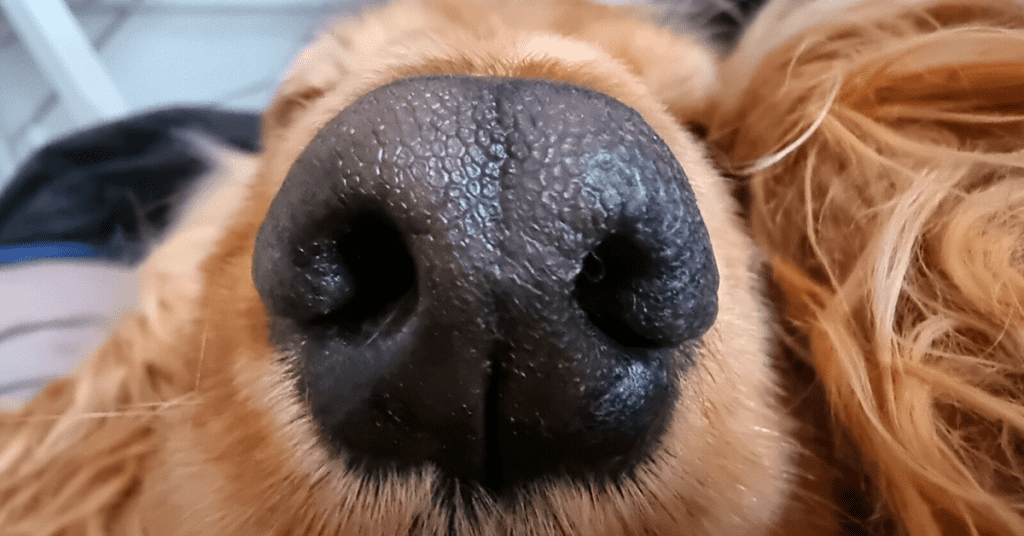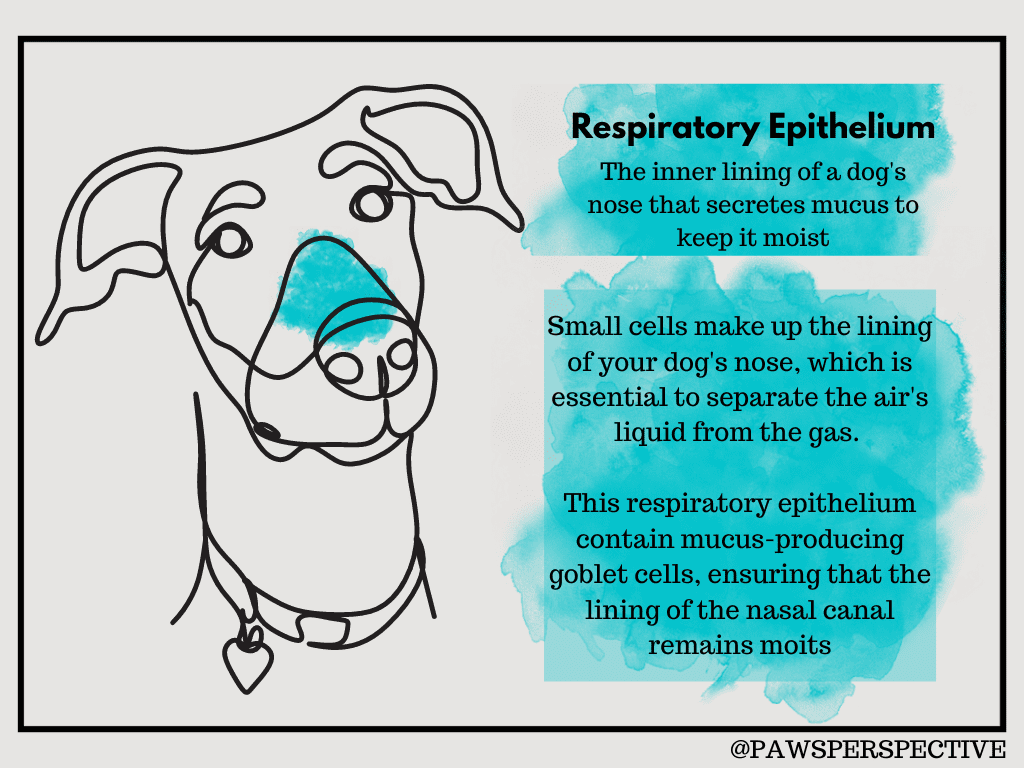For years I believed that when a dog’s nose is dry, they’re sick. But if the nose was wet, they couldn’t be that ill, could they? So, I used that method to confirm that I should take my dogs to the vet.
Okay, I didn’t JUST look at the nose, but if my dog looked a bit off, I’d use the nose wetness to indicate how severe it may be. It was only when I started my dog enthusiast journey that I realized it was not the case.
Usually, a healthy dog’s nose is wet, but a dry nose doesn’t necessarily mean the dog is sick. Some dogs naturally have drier noses than others. Sometimes, a dry nose results from something entirely different, like having a lot of physical activity during the day. So, relying on the wetness of a dog’s nose to determine their health is not as accurate as you may have thought.

Now that I know why my dogs’ noses are wet and the possible reasons they could be dry, I’m not as paranoid about their health anymore. But, I’ve also learned what signs to look out for to know if I should take my dogs to the vet. So, if you’re a committed dog parent like me, stick around and learn from my dog parent experience.
How a Dog’s Nose Stays Wet
It’s almost common knowledge that a dog’s nose is wet and cold. I mean, any dog owner had an experience of their four-legged friend waking them up with a cold snoot pressing up against them. But how do their noses stay wet all the time?
A dog’s nose stays wet because the glands in the inner lining of the nostril produce mucus, and the dog licks the nose frequently, keeping it moist. These two mechanisms are how a dog regulates certain bodily functions necessary for their survival.
So, either your dog’s body ensures the nose stays wet, or your dog creates the wetness themselves. But how and why does this all happen?
How and Why A Dog’s Nose Produce Mucus
I always believed that there is power in education. Understanding the how and why your dog’s nose is naturally wet makes it easier for us dog parents to understand their health and wellbeing. So, educating yourself about your dog is one of the best gifts you can give your canine friend.
How Your Dog’s Nose Produces Mucus
Like all living things, dogs have extraordinary bodily abilities to keep themselves healthy and resilient to what their environments might bring their way.
Your dog’s nose canal has small cells called respiratory epithelium cells that line the inside of the nose. These cells contain other cells, called goblet cells, which secretes mucus to keep the nasal canal moist.
The moisture moves from the inside of the nasal canal to the outside as your dog breathes. Then, some of the mucus sits on the dog’s nose.

Why Your Dog’s Nose Produces Mucus
The reason your dog’s nose produces mucus to stay moist is to help with normal bodily functions, including:
- Regulating body temperature, meaning it helps to cool your dog off on a hot day.
- Blocking any harmful particles that may enter the lungs and affect your dog’s health.
- Separating the air’s liquid from the gas, which helps prevent fluid from entering the lungs.
- Trapping scent particles to stay on the nose for longer so your dog can properly analyze the smells around them.
- Trying to get rid of harmful particles or organisms. Sometimes your dog’s nose might be overly dripping mucus, indicating flue-like symptoms. In the case of excessive dripping, you can consider taking your dog to the vet for a consultation (we’ll talk a little more about this later in the post).
Why Dogs Lick Their Noses
Another reason your dog’s nose might constantly be wet is that they lick their noses. You’ve probably seen your dog do it many times but didn’t quite realize it at the moment. But why do dogs lick their noses in the first place?
Dogs lick their noses to keep them clean, to gather scent particles in the mouth, or because they’re stressed out. These three reasons can vary from dog to dog, so some might exhibit more of one behavior than the other. Let’s have a look at what each means:
- Licking it clean: Your dog might have dirt or other substances on their nose that they attempt to lick off.
- Doing it as a calming signal: Excessively licking at the nose signifies that your dog is stressed and licks to self-soothe in this stressful situation.
- Gathering scent particles on the nose to enhance their smell: Because scent particles accumulate on the moist nose, your dog might try to get the scent particles into their mouth. They do this by licking the nose. This way, they can analyze the particles through their mouth’s Jacobson’s Organ, a fluid-filled sack used to enhance their scenting ability.
Interesting Fact: “Odour molecules dissolve in the mucus and are transported in the air breathed in up to the olfactory receptors in the top of the dog’s nose. If there is not enough mucus the dog licks its nose. The average dog produces about a pint of mucus a day.”
Medical Detection Dogs
Reasons Your Dog’s Nose Might Be Dry
We’ve looked at why a dog’s nose is wet, but now we should consider why it could be dry—as with anything in life, looking at things from a few different perspectives will help you get the complete picture of what’s going on. This case compares the wetness and dryness of dogs’ noses.
A dog’s nose can be dry because of heat, activity, time of day, old age, or illness. So, there’s no clear indication that a dry nose means your dog is unhealthy. It could be many reasons, so let’s unpack them, so you have a better idea of your dog’s health status when looking at their nose.
It’s a Hot Day
When it’s hot outside, your dog’s nose can be dry because the moistness evaporates. That’s because it’s the body’s way of keeping your dog’s body cool in warmer weather. Apart from only sweating through their paw pads and panting, dogs don’t have many other ways to keep their body temperatures in the normal ranges on hot days.
So, the wet noses aid in cooling them off through evaporation, so there’s not a lot of moisture left to keep the noses moist. That’s why a dog’s nose would seem dryer in warm weather than in colder weather.
Your Dog Had Lots of Exercise or Playtime
As your dog runs and plays around, their breath quickens as they try to let more oxygen into the lungs and carbon dioxide out of the lungs. Their bodies react to activity because their muscles, lungs, and heart need more oxygen to function correctly in this active state. So, their breaths quicken, and their heart rates pick up the pace.
The more air enters and exits your dog’s nose; the more moisture goes with it. Think about it. If you blow air over a wet cloth, eventually, the fabric will dry out. So, your dog’s nose may be drier if they were active during the day.
Your Dog Woke Up After a Nap
One of the methods dogs use to keep their noses wet is to lick them frequently, but they can’t do that when they sleep. Your dog’s nose could be drier when they wake up than the rest of the day. That’s because your dog doesn’t lick their nose while napping as they would when they wake up.
Your Dog is Older
Like people, older dogs’ bodies don’t function as they usually did when they were younger. This can mean that their ability to secrete moisture from their nasal canal is not as effective as it was.
The less mucus their respiratory epithelium cells produce, the less moisture is available to accumulate on the nose itself. So, your senior dog might have a dryer nose than younger dogs.
How to Know if Your Dog is Sick
Okay, so it’s clear that a dry nose doesn’t necessarily mean your dog is sick, but it can sometimes mean they’re under the weather. But how do you distinguish between a typical dry nose and a sick one?
The trick is to get to know your dog’s nose wetness fluctuations. So, observe your dog daily and determine when their nose is more wet or dry. This way, you can spot any unusual changes in nose wetness and consult a vet should you want to.
When a Dry Nose Means Your Dog is Sick
If your dog is sick and has a dry nose, other symptoms will accompany the nose dryness. So, if you’re concerned, see whether your dog has some of the following symptoms as well:
- Vomiting
- Pale gums or tongue
- Lethargy
- Change in appetite
- Change in behavior
- Loose stools or diarrhea
- Sunken dry eyes
- Cracked or bleeding nose
- Other skin symptoms, like dryness and itching
These signs accompanied by a dry nose can mean your dog is suffering from one of many different illnesses or conditions. This can range from dehydration to allergies, so you must get your vet’s opinion to keep your canine friend in tip-top shape.
“I’ve had a few unfortunate vet visits where I had to take really sick dogs to the vet. I noticed that the vets’ types of questions were almost always the same no matter which practice I went to. If I couldn’t answer these questions, the vets would have found it more challenging to get to the root of these illnesses.”
Juan’Ri Strauss
The Paws Perspective
It’s easy to get carried away and worry about our dogs’ health, especially if we notice something like a dry nose. Don’t worry, though! You’re not alone, and I know you’re looking after your canine friend as best you can. You’re doing a good job!
Remember, you know your dog better than anyone else. And the more you educate yourself on different dog-related topics, the better dog parent you can be to your furry companion. So, take this knowledge and continue being the excellent dog parent you already are!
